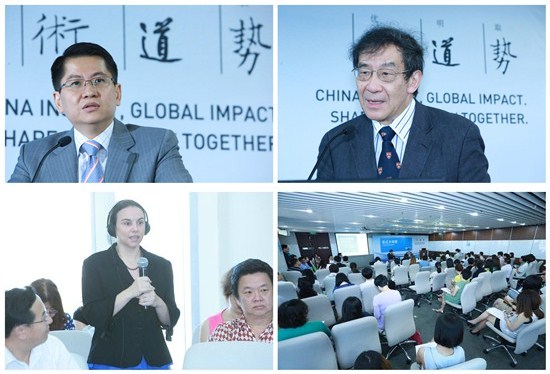
Joining the third edition of “Cultural China & Global Citizen” speaker event was Stanley Loh, Singaporean Ambassador to the People’s Republic of China. Ambassador Loh shared insights about the relations between Singapore and China, the concept of ethnic Chinese, as well as the success of Singapore in dealing with its multiethnic social make-up. In the following discussion between Ambassador Loh and professor Tu further topics were raised, such as cultural identity through language, the challenges China faces in globalization as well as the importance of soft power in East Asia.
Ambassador Loh’s presentation began by outlining the historical economic relationship between the two countries. From the early opening up of the Chinese economy, Singapore played a key role in bringing in investment into China, becoming today its third largest investor. Such cooperation has been constantly changing, from an earlier interest in industrial expansion, to a later focus on higher-end technology, food safety and environmental protection. The expanding importance of China on the other hand is creating opportunities for the development of an international RMB market, which is likely to become the new field of cooperation amongst the two countries.
Professor Tu offered further cultural insights to the discussion, emphasizing the influence of the multi-cultural history and make-up of Singapore in its societal and economic development. The institutional and judicial experience coming from Britain, the mixture of values of the main ethnical groups of the city and a strong emphasis on tolerance and integration by the Singaporean government, allowed for Singapore to develop an international and progressive vision. As a consequence, the city became the region’s main trading, financial and transport hub, as well as a center of expertize and an exemplar model studied by both Singapore’s neighbors and China. Today this has effectively made the small independent city a solid bridge between the various nations and cultures present in the region.
The discussion between Ambassador Loh and professor Tu brought up other topics and animated the event. An exchange on the importance of dialects and their significance to the cultural identity of a nation began this session. Professor Tu pointed out that ethnic Chinese in Singapore have to learn Mandarin at school as mother tongue, when often in fact no member of the student’s family has ever spoken Mandarin as their mother tongue, but rather a variety of mutually unintelligible Chinese dialects. Ambassador Loh’s opinion on this matter was based on a judgment of feasibility. Most of all, with the need of having a bridge language amongst all ethnic Chinese, and the future prospects of a much more important China, standard Mandarin was key to this, while English was to be expanded to bridge to the international community.
The following Q&A session raised several questions and topics, to which Ambassador Loh and professor Tu jointly replied to. These topics included included: the attitude of the younger Singaporean generations towards Mainland China and their feeling about their cultural heritage; the differences between East and West, examined through the comparison between the concept of “American Dream” and the “Chinese Dream”; the significance and extent of Chinese and Singaporean soft power in South-East Asia and the lessons that China could draw from the Singaporean experience.
“Cultural China & Global Citizen” is a series of events organized by CKGSB and led by Professor Tu Weiming, Chairman of the CKGSB Committee on the Humanities, and Director of the Harvard-Yenching Institute. In each of the series, Professor Tu invites a guest who represents a unique culture to share his/her insights on their history, religion, society and culture with CKGSB’s students and alumni. CKGSB is the first and only business school to include humanities in its core management education curriculum, promoting humanism in leadership.